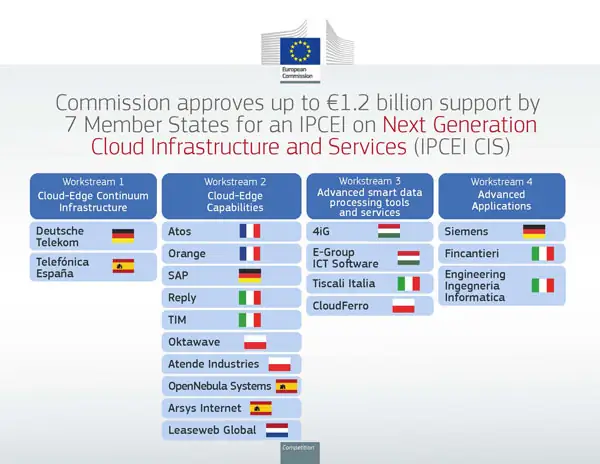In an attempt to break the US monopoly and promote European innovation in cloud computing, the European Union (EU) has approved up to €1.2 billion ($1.30 billion) of state aid for a European cloud computing project. This decision was made by the European Commission, which greenlighted the state-aid partnership for cloud computing among EU member countries. The project is called Important Project of Common European Interest (IPCEI). It aims to foster collaboration and investment in cloud computing technologies across the continent.

The fund which is for the “Next Generation Cloud Computing Infrastructure and Services” aims to promote the participation of EU enterprises in the field of cloud computing. The funding includes seven countries including France, Germany, Hungary, Italy, the Netherlands, Poland and Spain. However, this funding is co-sponsored by other EU nations. IPCEI involves 19 projects from 19 brands. These direct players will collaborate to develop Europe’s first, EU-wide interoperable multi-provider cloud edge continuum.
The European Commission stated that these countries will provide up to 1.2 billion euros in public funds. This should drive 1.4 billion euros in private investment. The EU IPCEIs also aim to bring together research, financial and corporate resources. This is to promote the EU’s economic growth and competitiveness and promote its green and digital transformation.
Recall that the EU has previously approved six IPCEI projects involving batteries, hydrogen energy, microelectronics and communication technology. This European cloud computing project currently has 19 companies participating. Some of the brands include France’s Atos and Orange, Deutsche Telekom, Telecom Italia and Telefonica.
Background
The EU has been working towards reducing its reliance on US technology providers and promoting homegrown innovation in various sectors, including cloud computing. The European Commission has previously approved state aid for other projects, such as the €1.2 billion subsidy for cloud and edge computing, which will be provided by France, Germany, and other EU members. This latest decision is part of the EU’s broader strategy to invest in European cloud computing capabilities and reduce its dependence on US technology providers.
Key Aspects of the Cloud Computing Project
The EU’s cloud computing project aims to:
1. Promote collaboration: The project encourages cooperation among EU member countries to develop and implement cloud computing technologies.
2. Invest in innovation: The state aid will be used to fund research and development in cloud computing, fostering innovation and the development of new technologies.
3. Reduce US dependence: By investing in European cloud computing capabilities, the EU aims to reduce its reliance on US technology providers and create a more diversified technology landscape.
4. Support SMEs: The project will also provide support for small and medium-sized enterprises (SMEs) in the cloud computing sector, helping them access funding and resources to develop innovative solutions.
Conclusion
The EU’s €1.2 billion state aid for cloud computing projects marks a significant step towards breaking the US monopoly and promoting European innovation in the cloud computing sector. By investing in homegrown cloud computing capabilities, the EU aims to create a more diversified technology landscape, reduce its dependence on US technology providers, and foster collaboration among its member countries. This decision demonstrates the EU’s commitment to promoting innovation and supporting the growth of the cloud computing industry in Europe. What do you think about the EU’s latest funding for cloud computing? Let us know your thoughts in the comment section below
Author Bio
Efe Udin is a seasoned tech writer with over seven years of experience. He covers a wide range of topics in the tech industry from industry politics to mobile phone performance. From mobile phones to tablets, Efe has also kept a keen eye on the latest advancements and trends. He provides insightful analysis and reviews to inform and educate readers.





